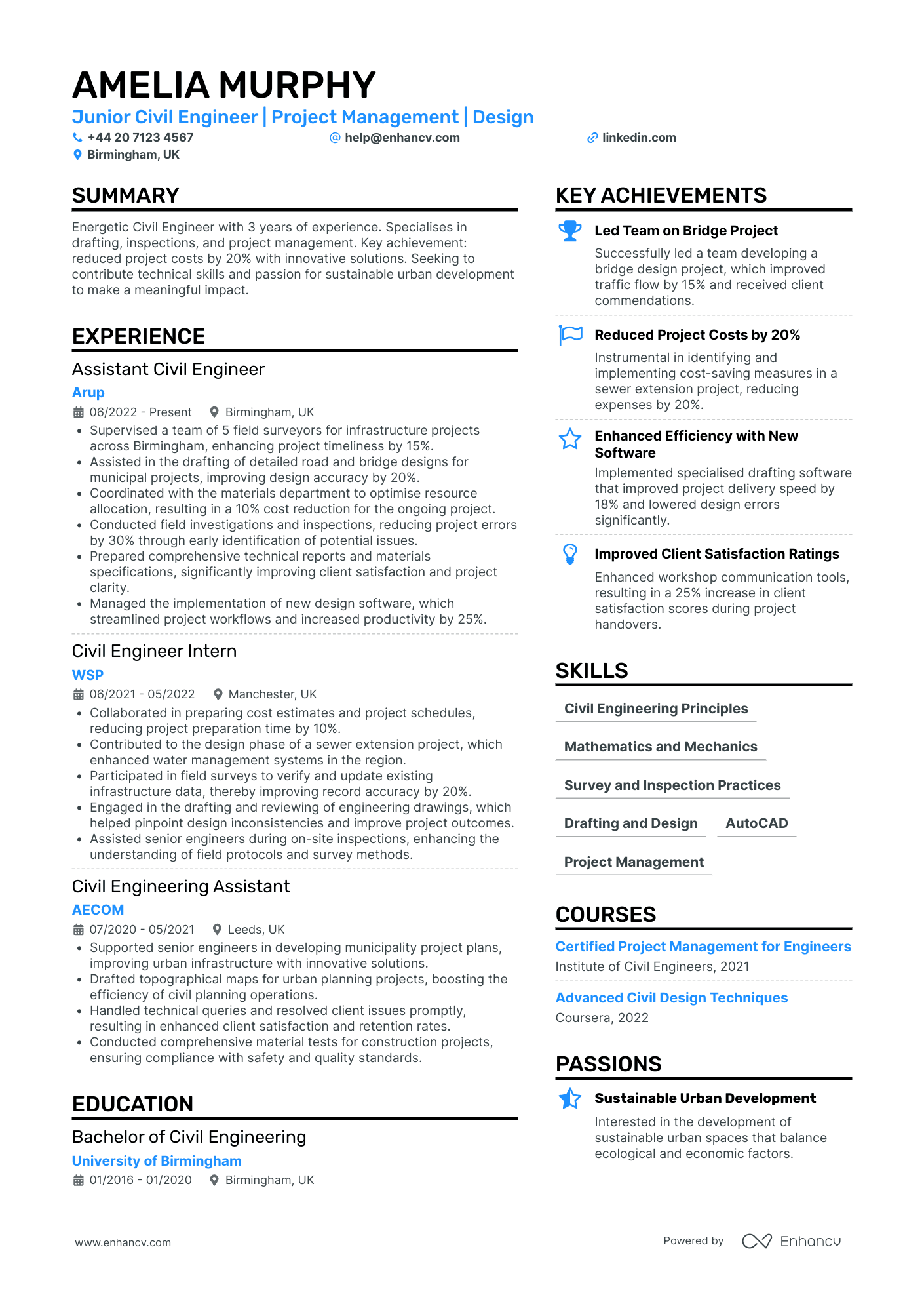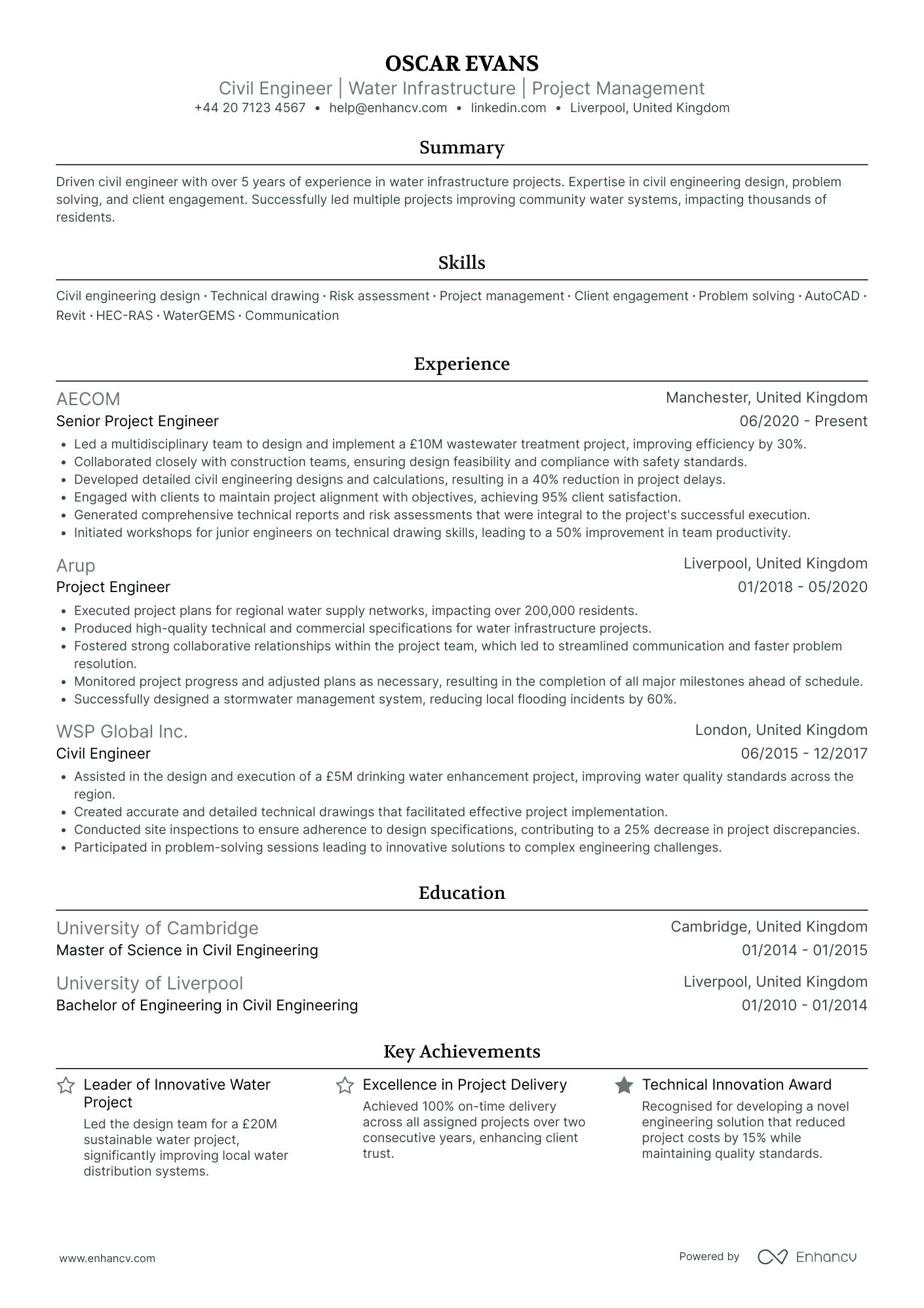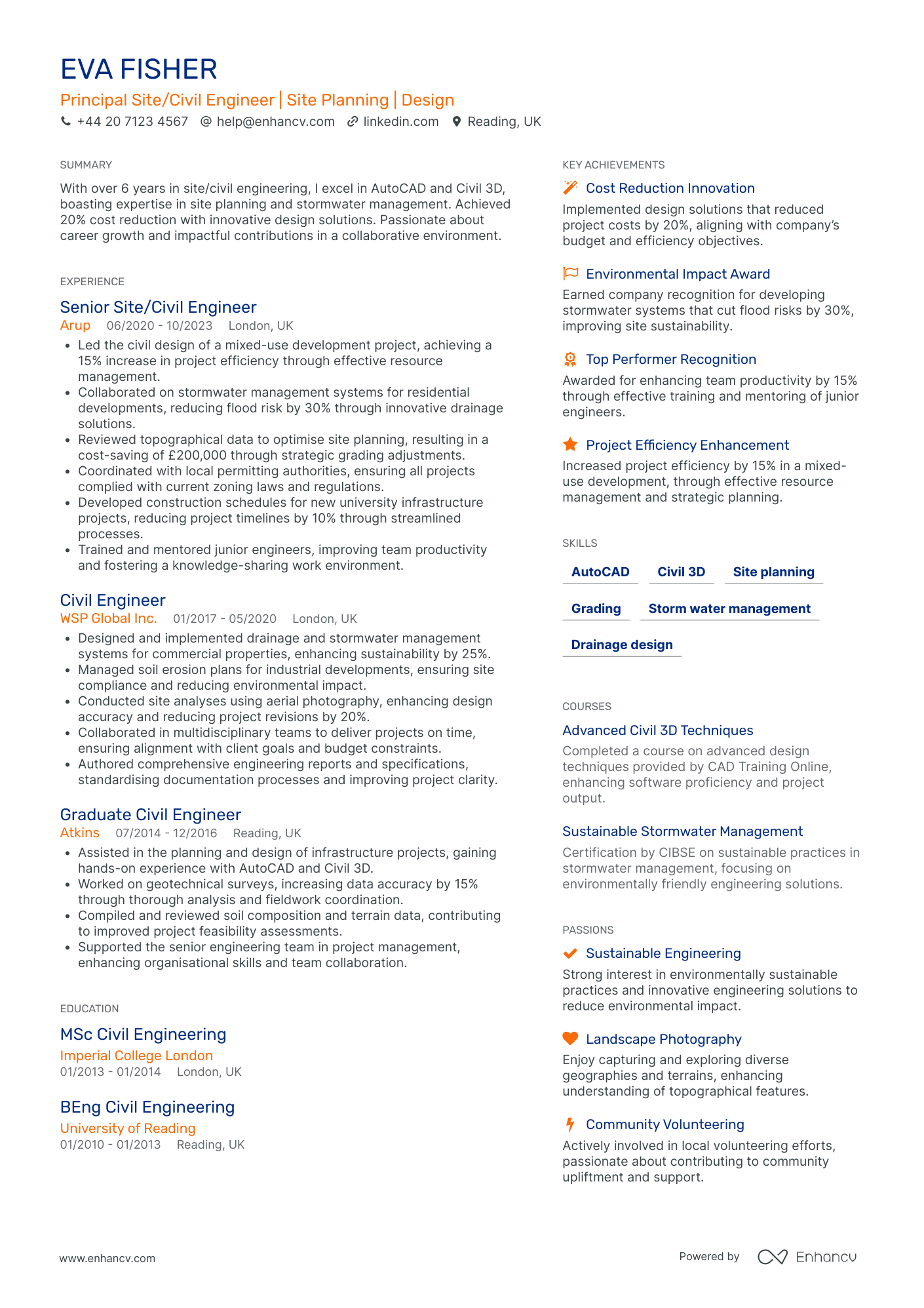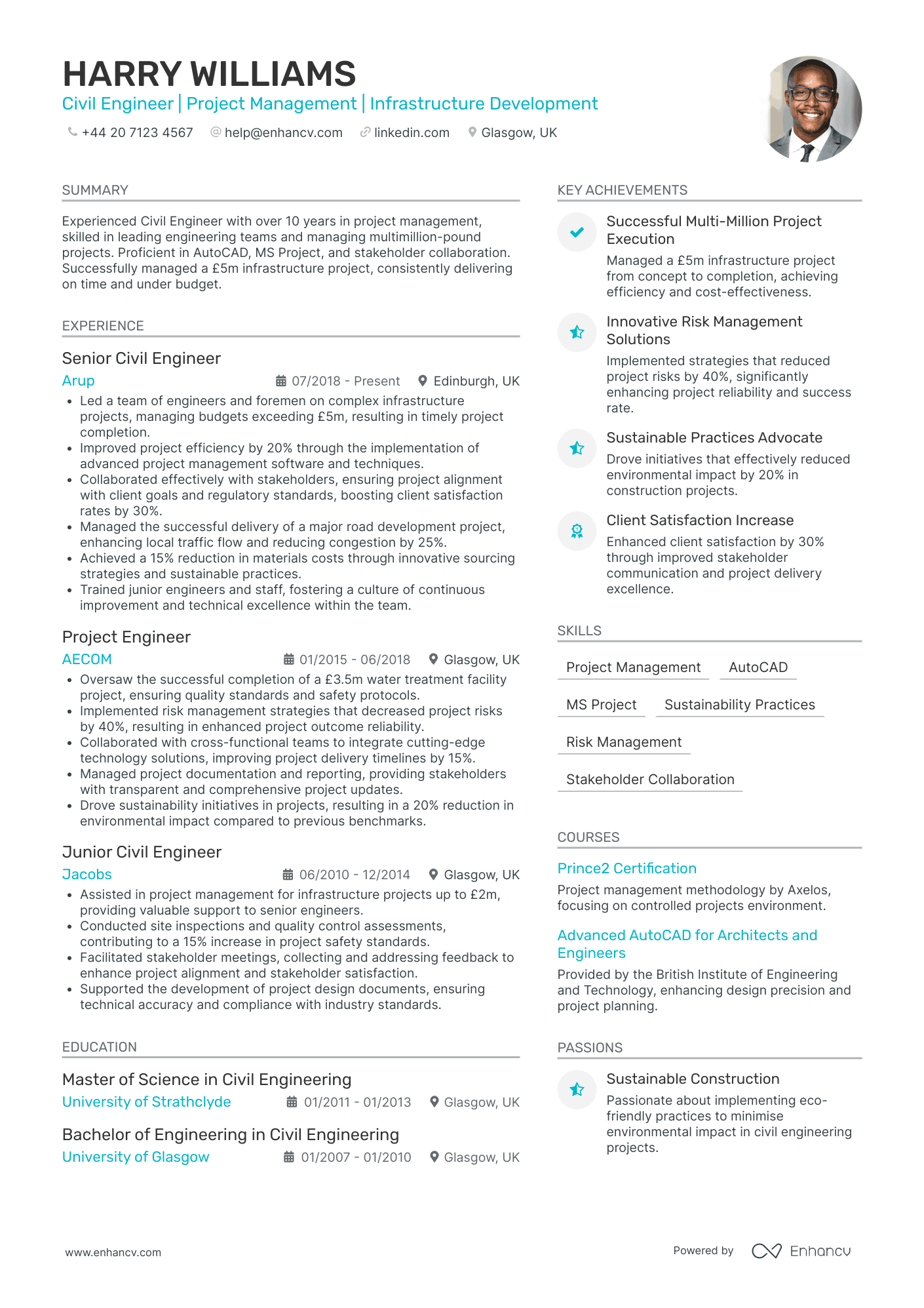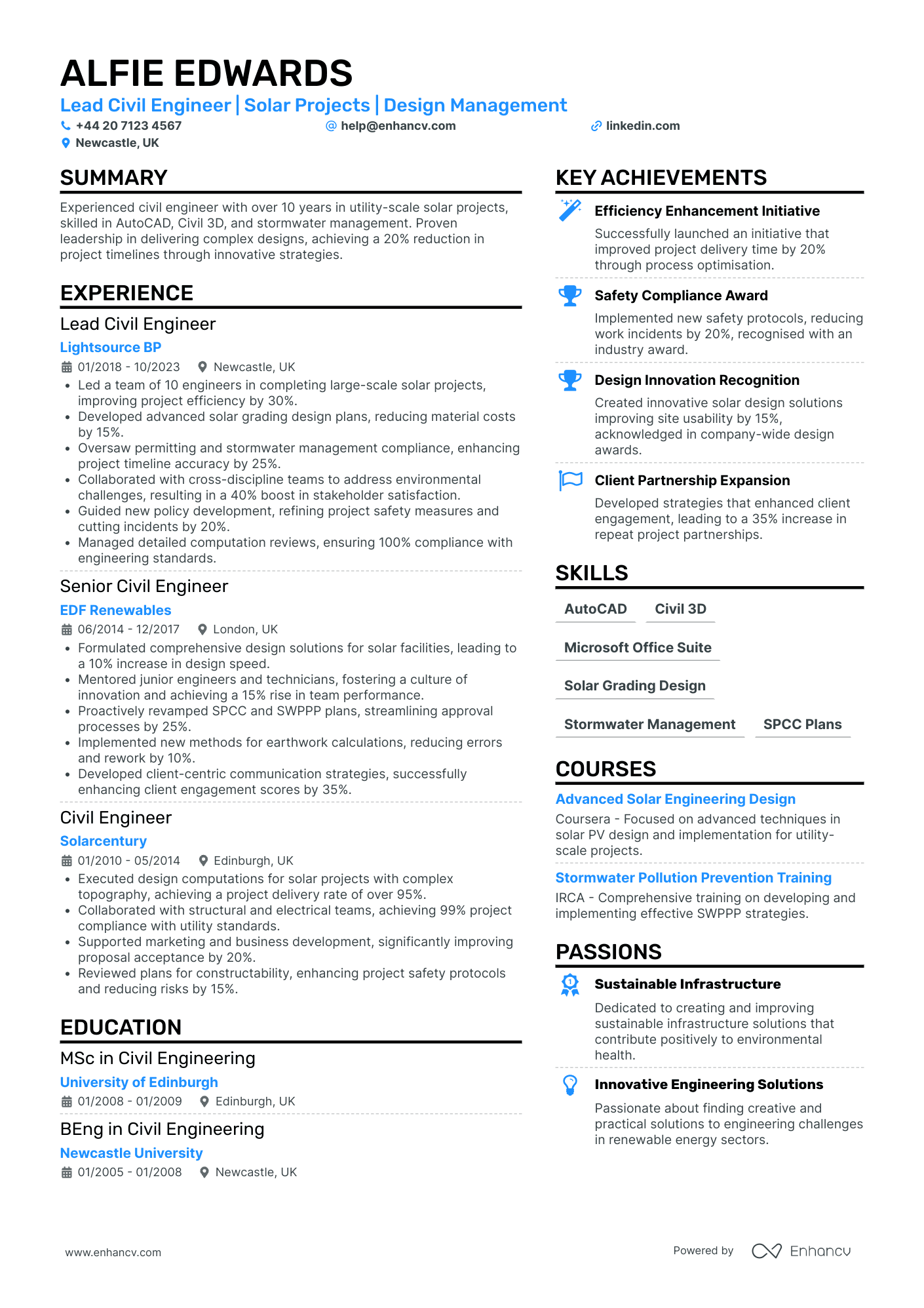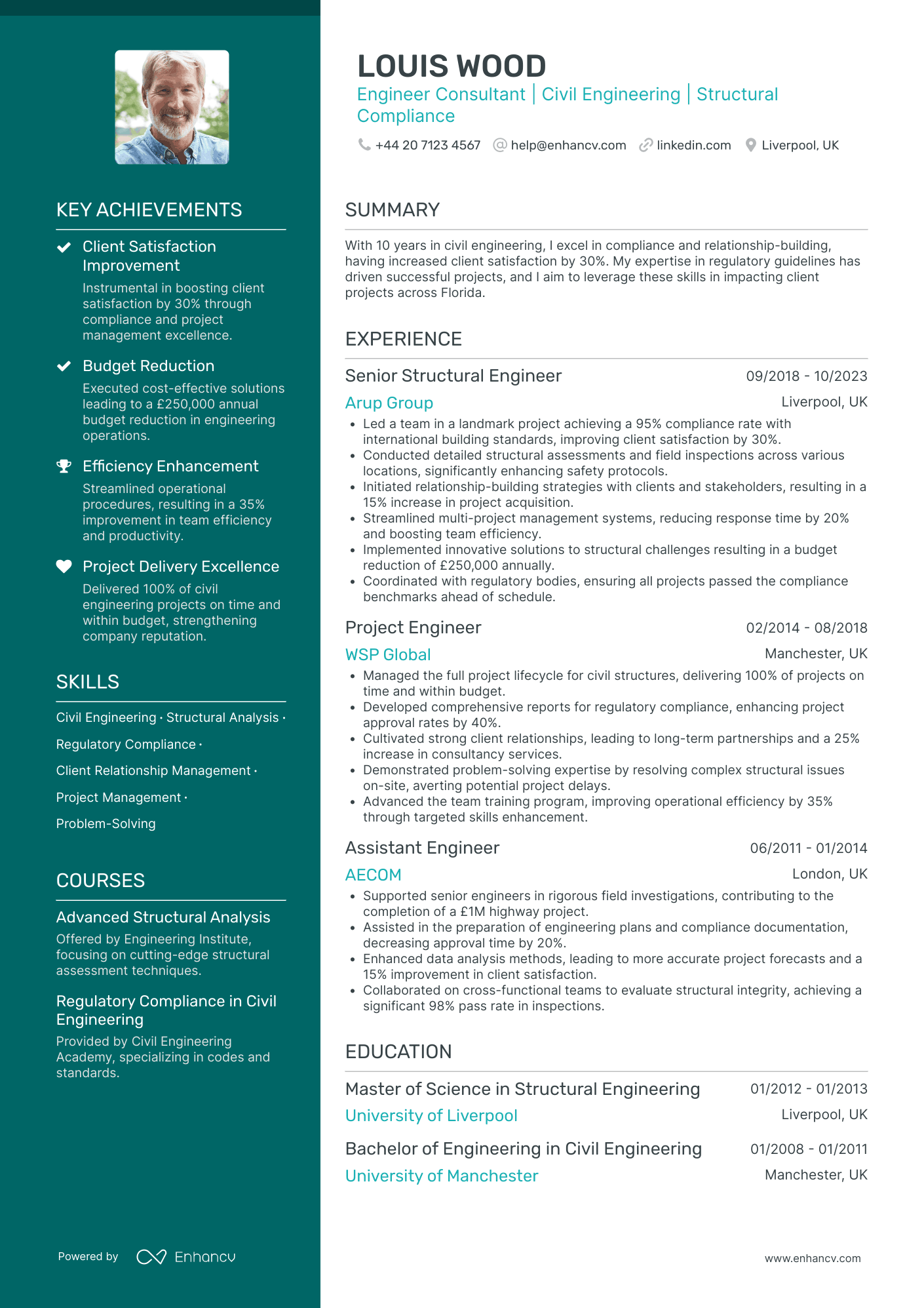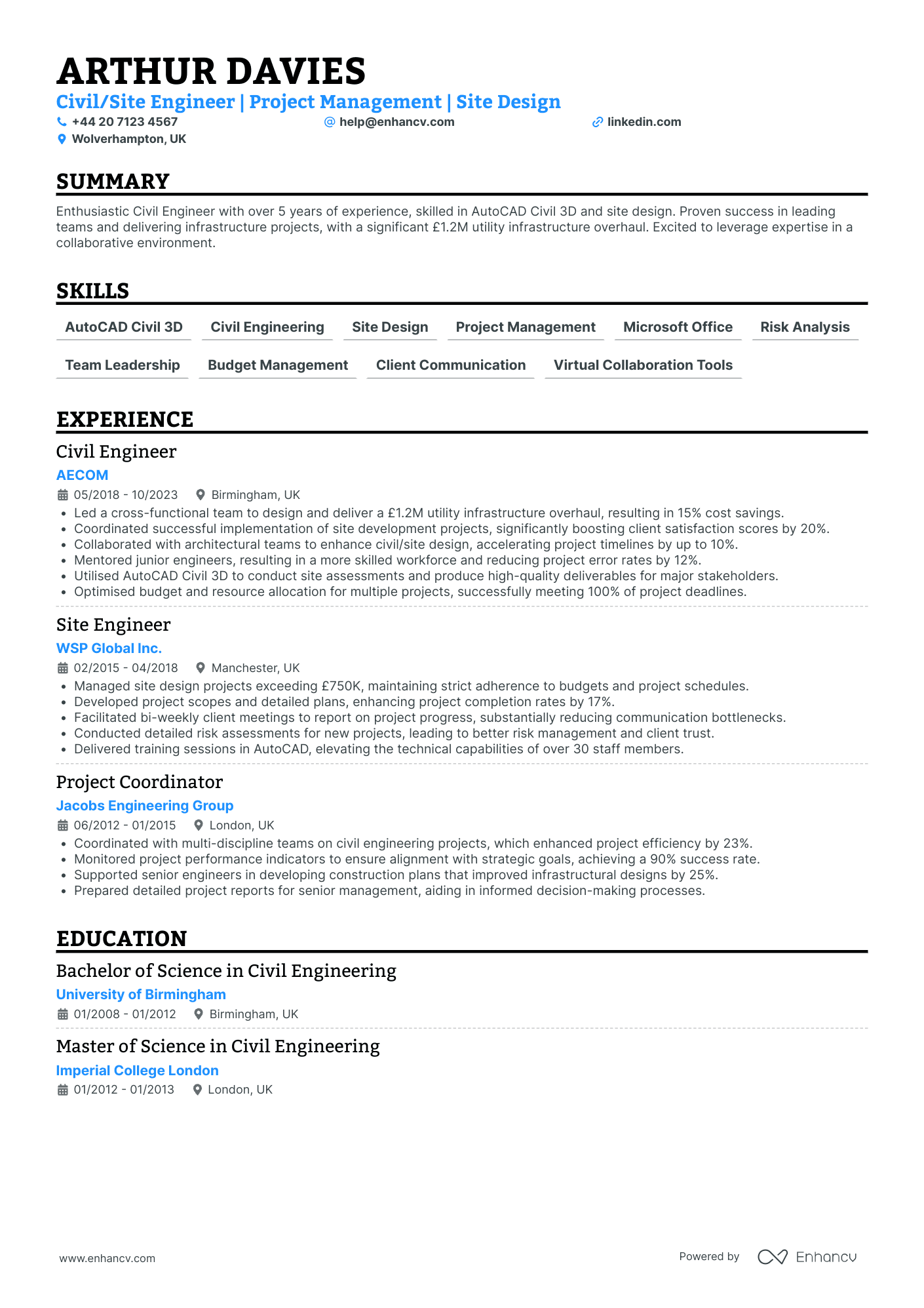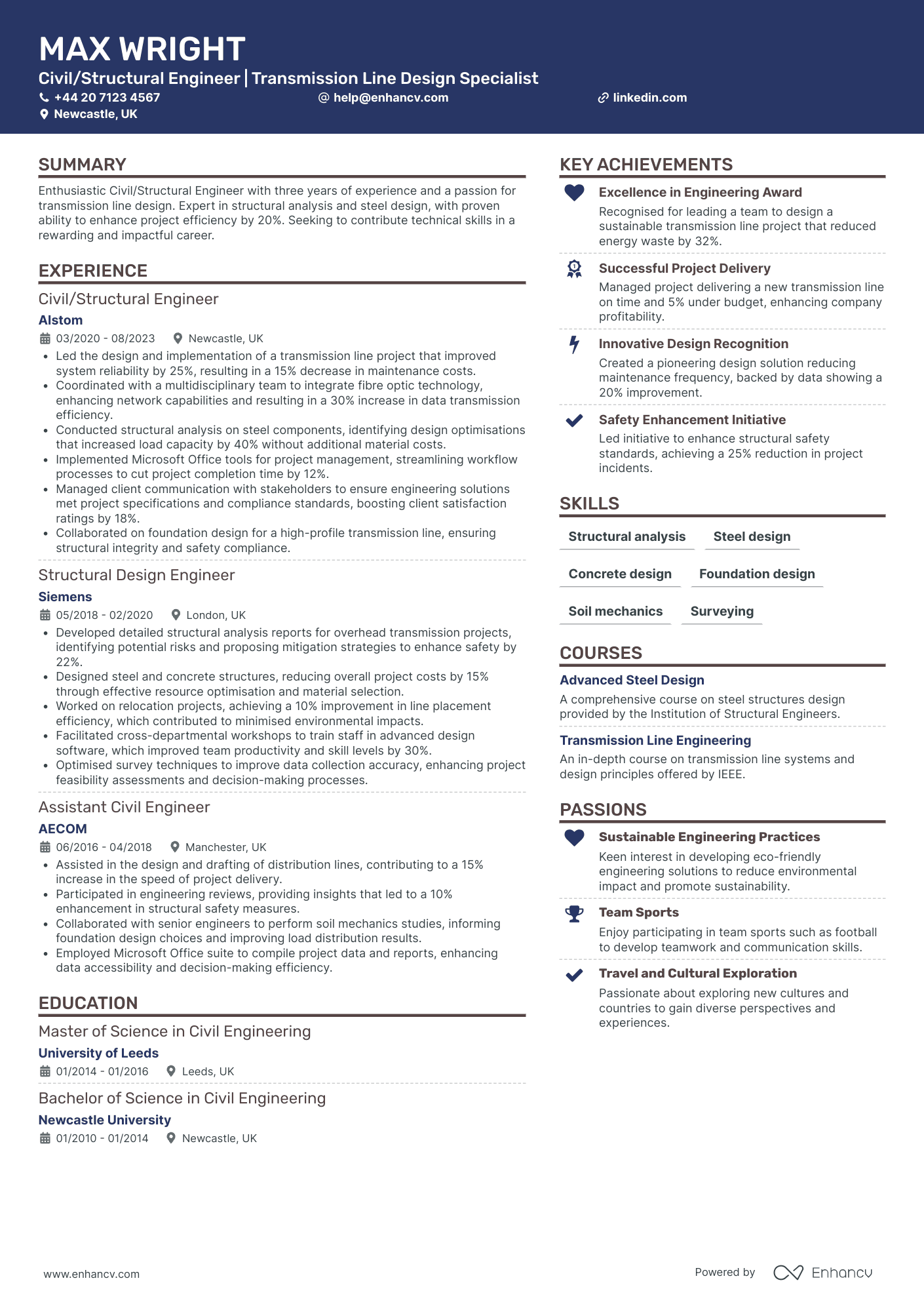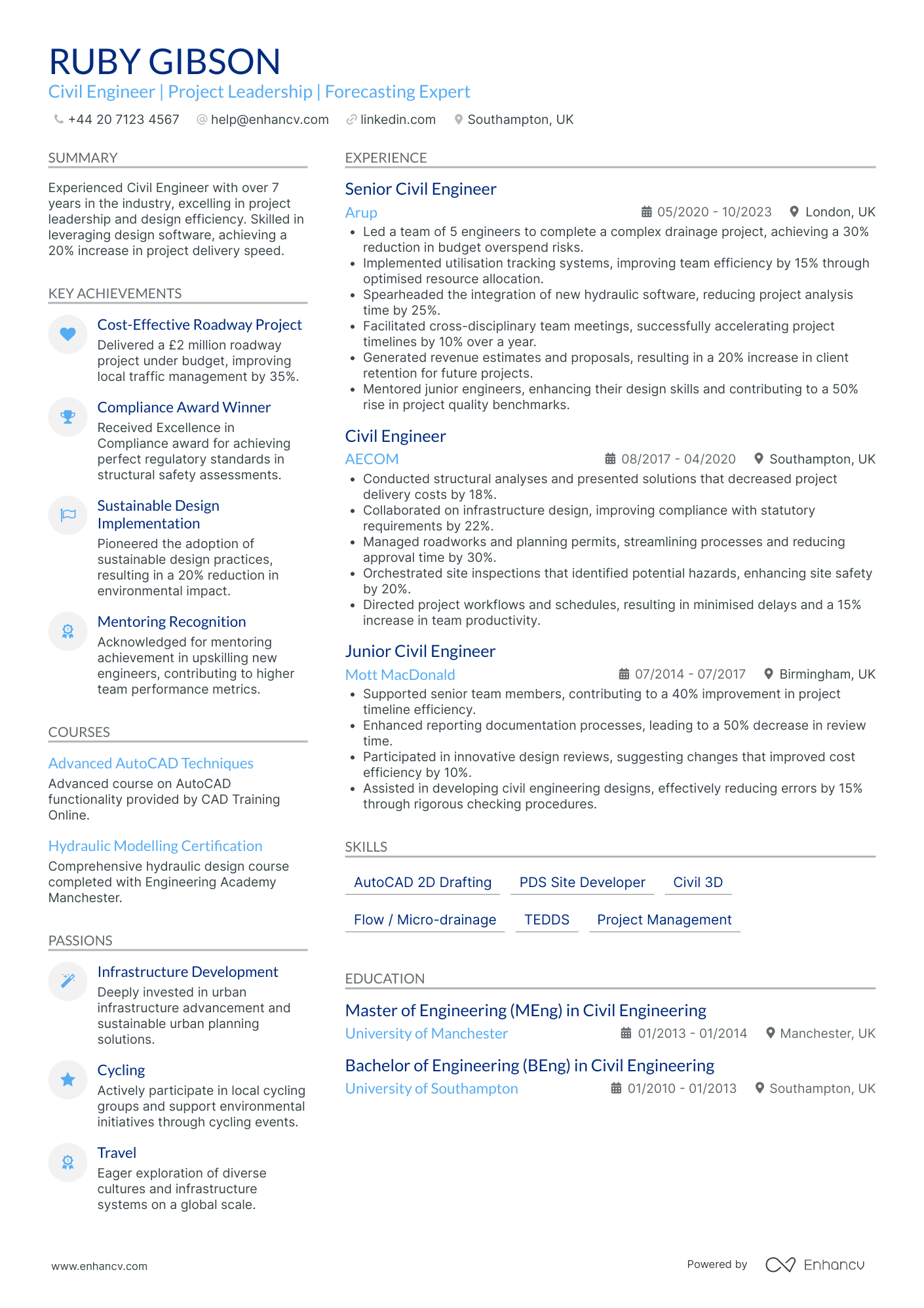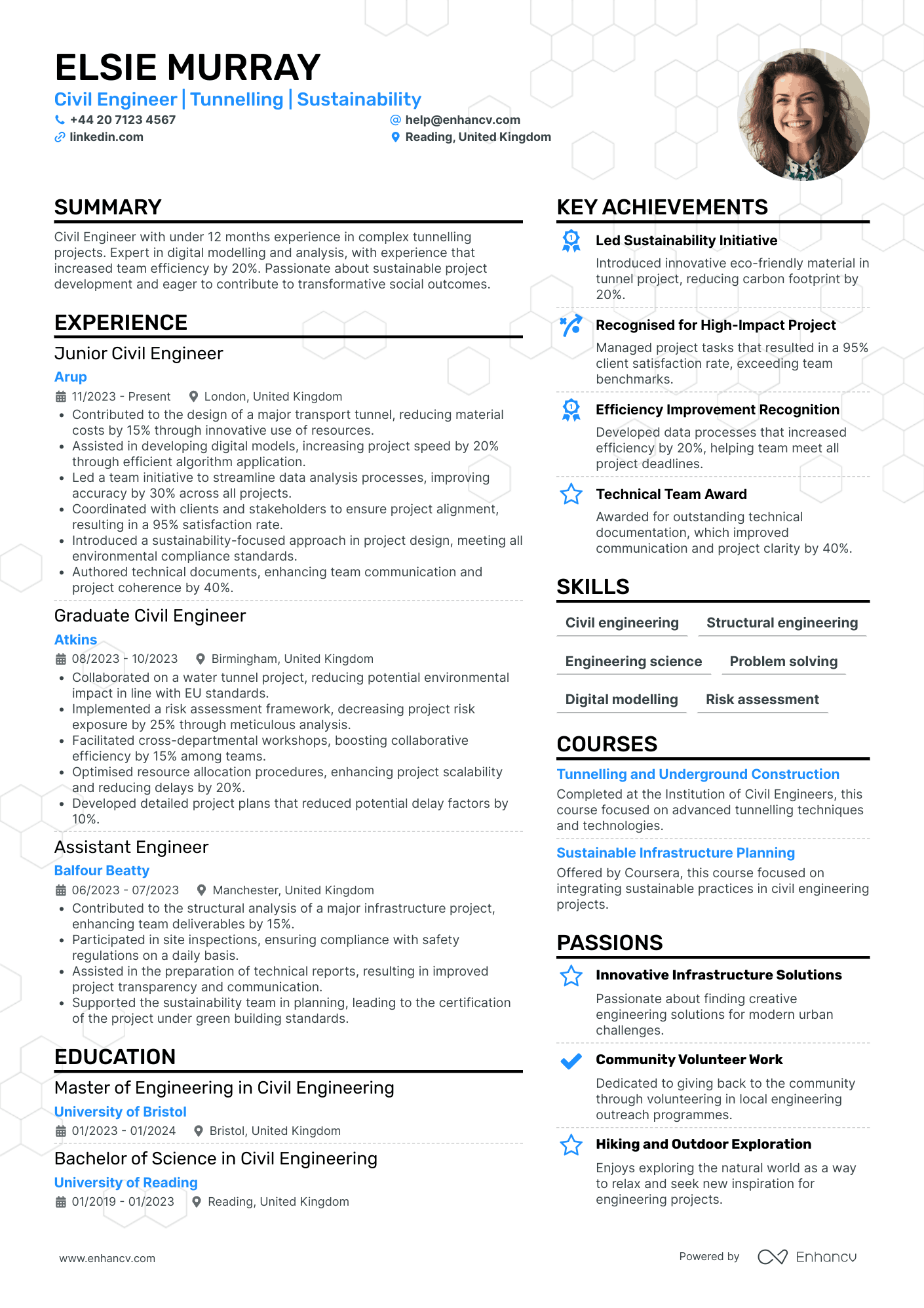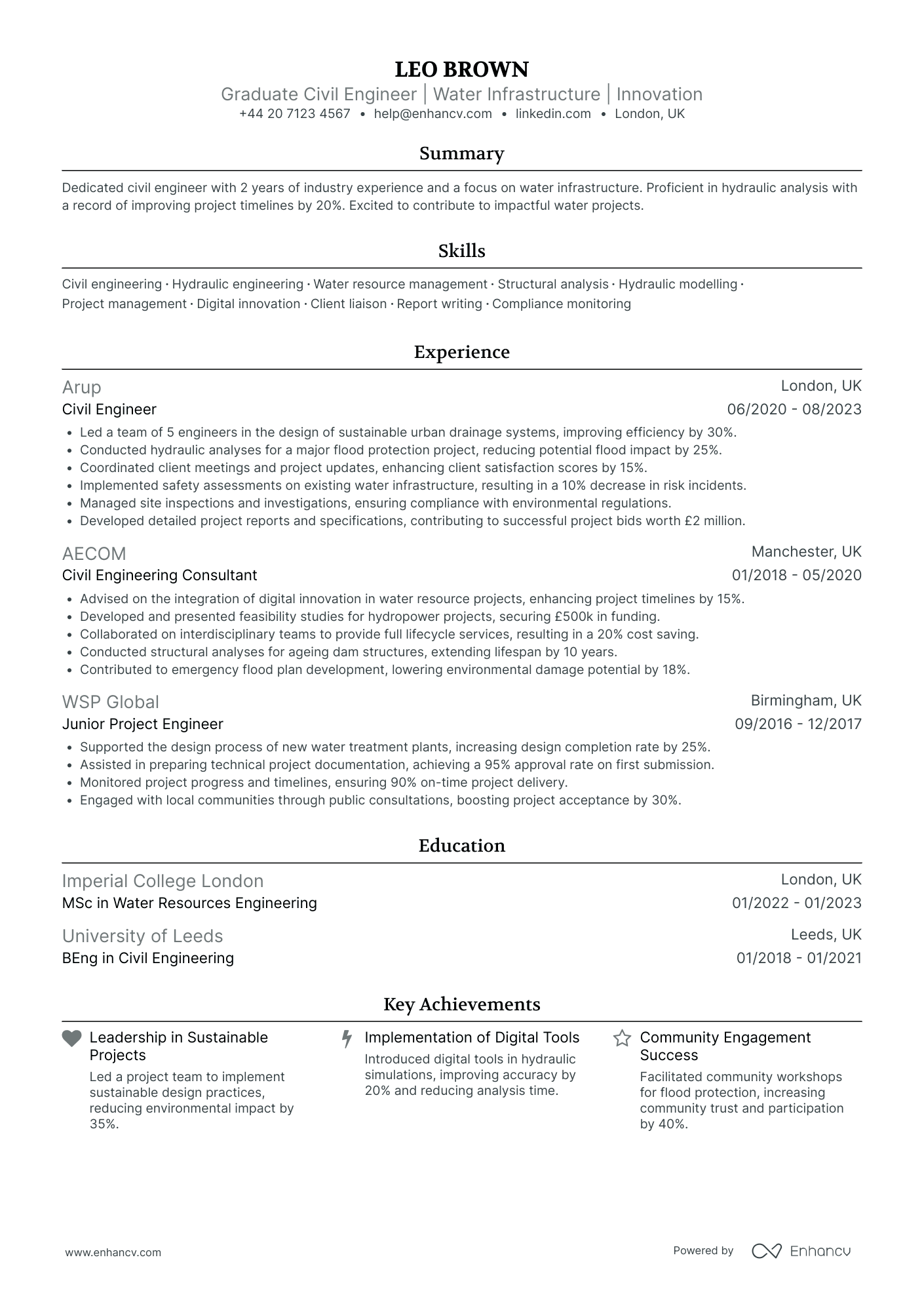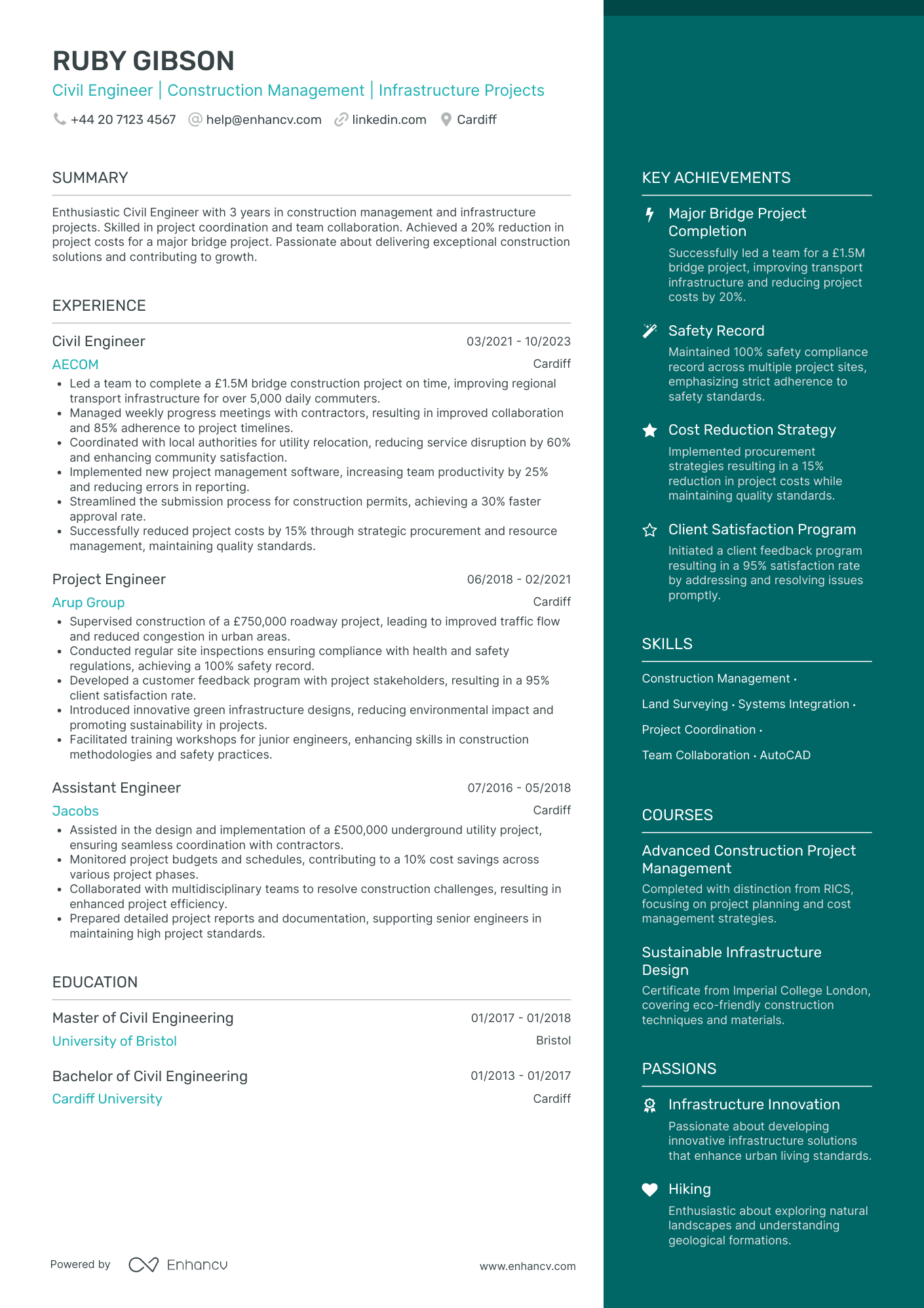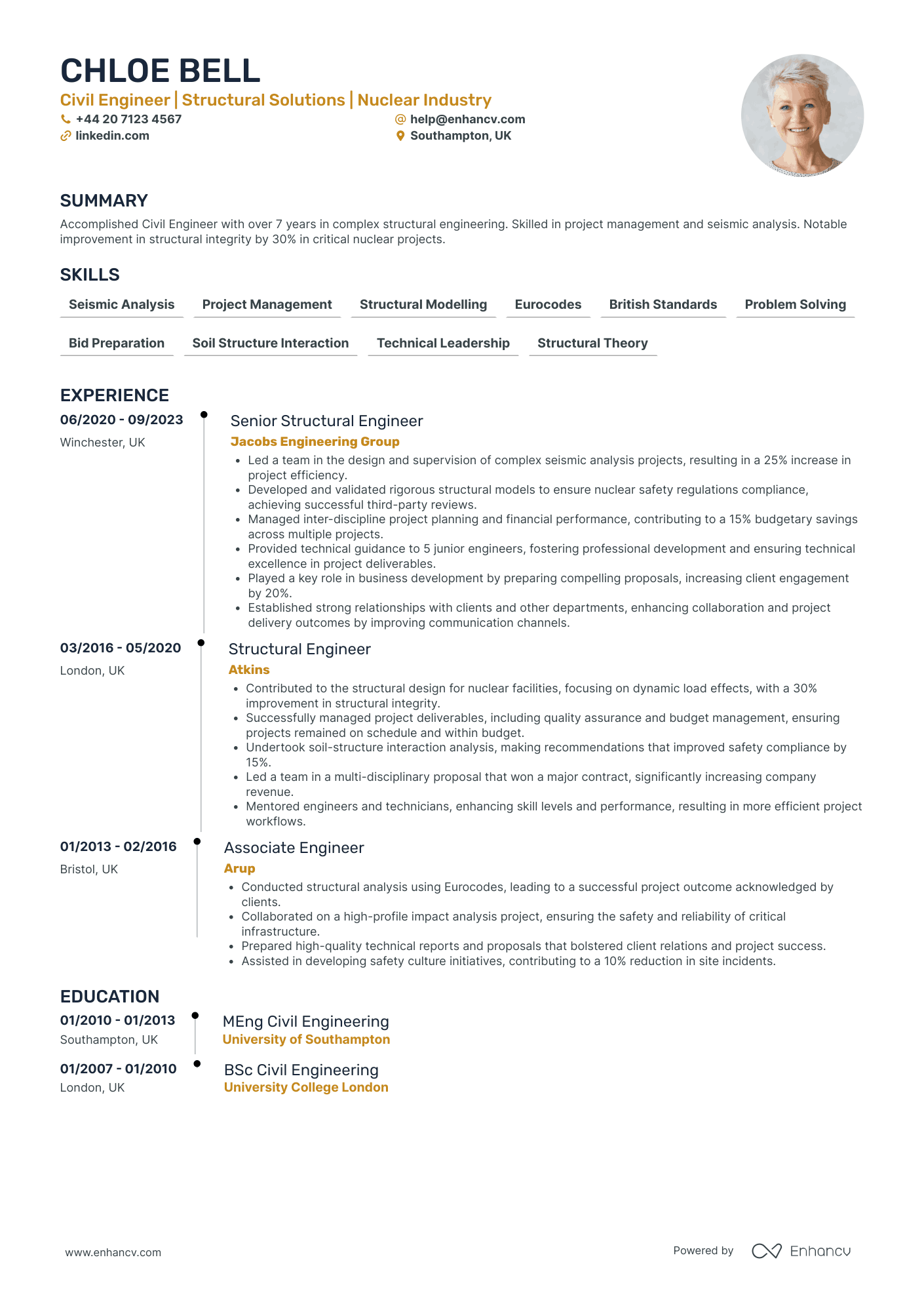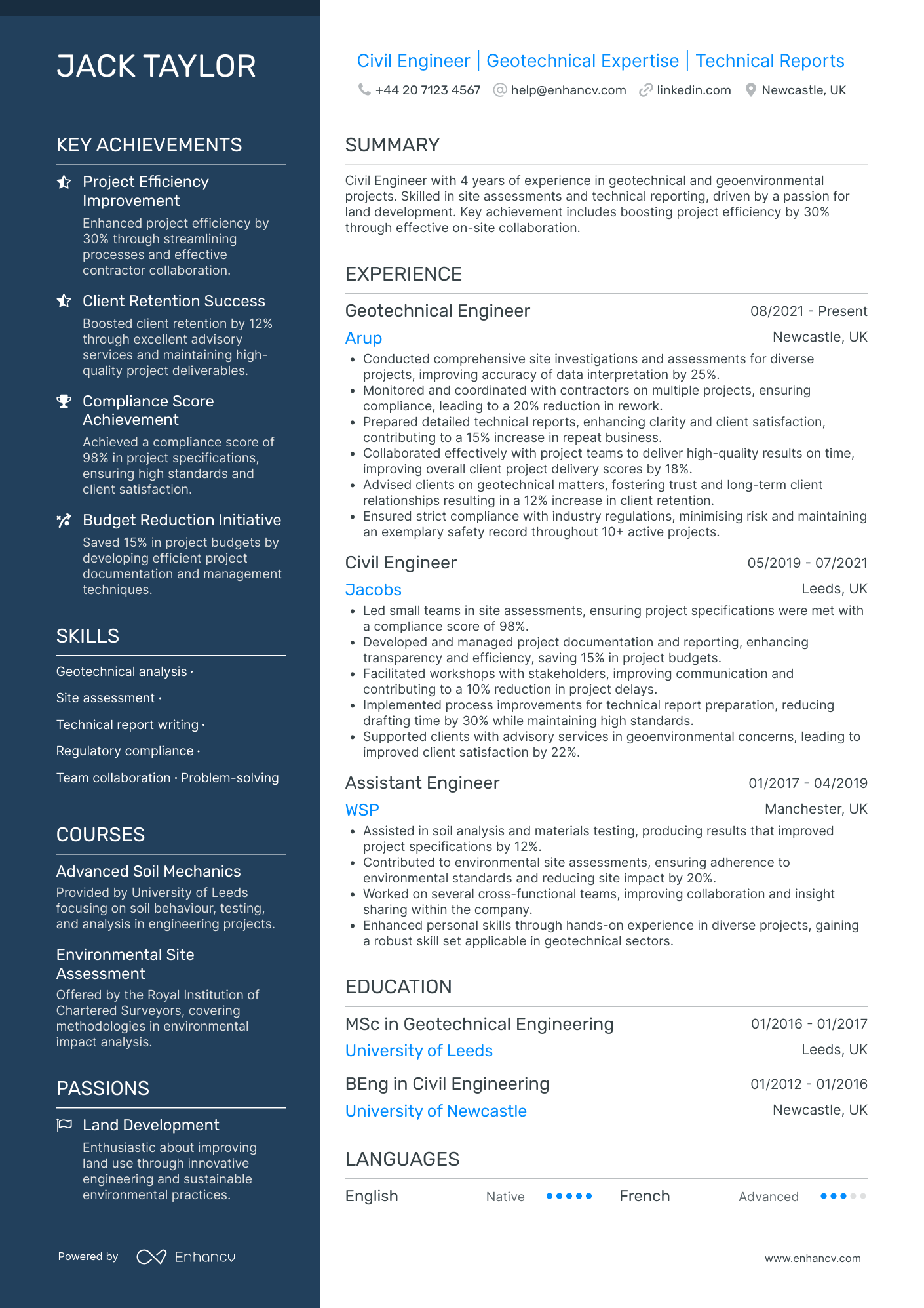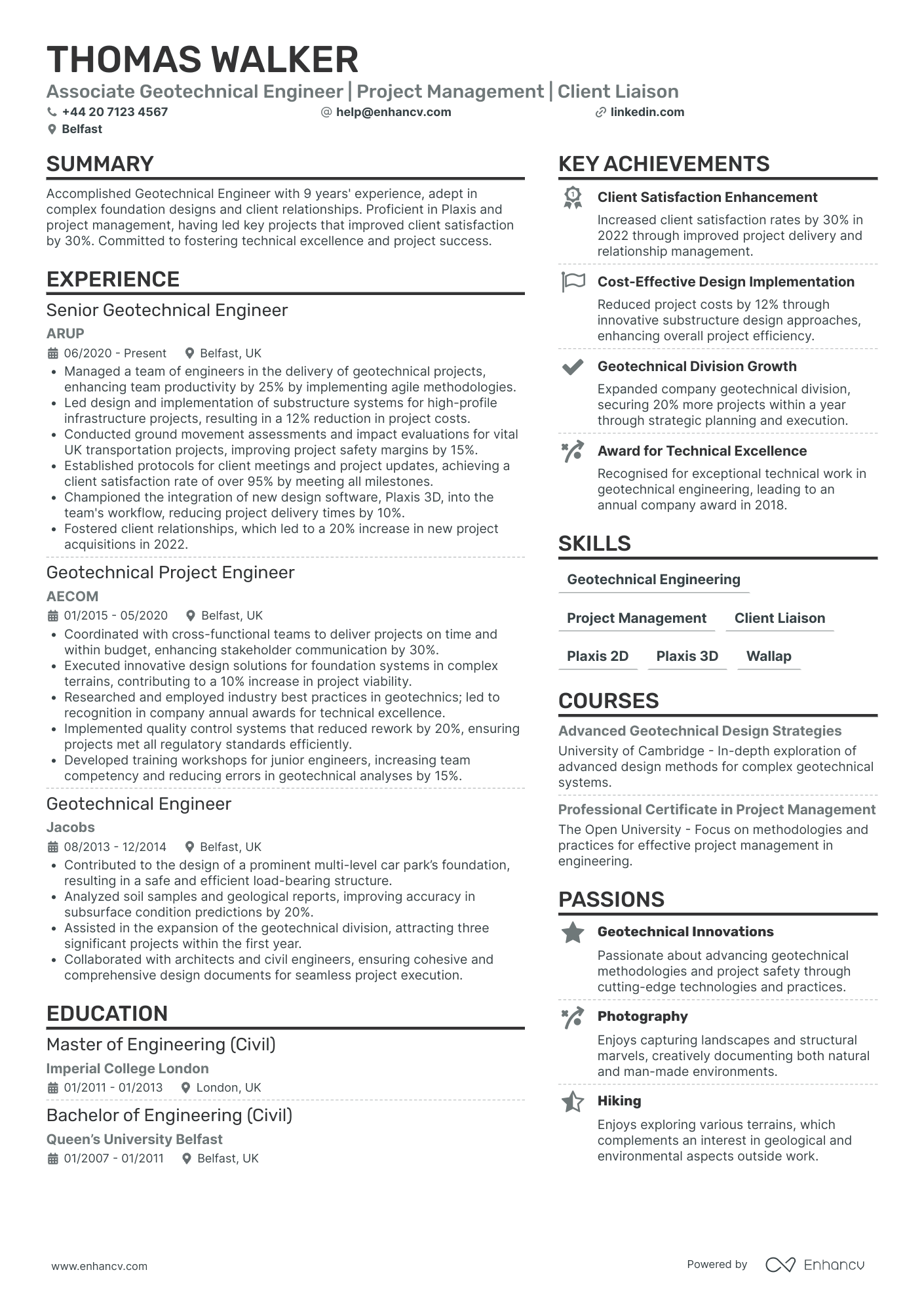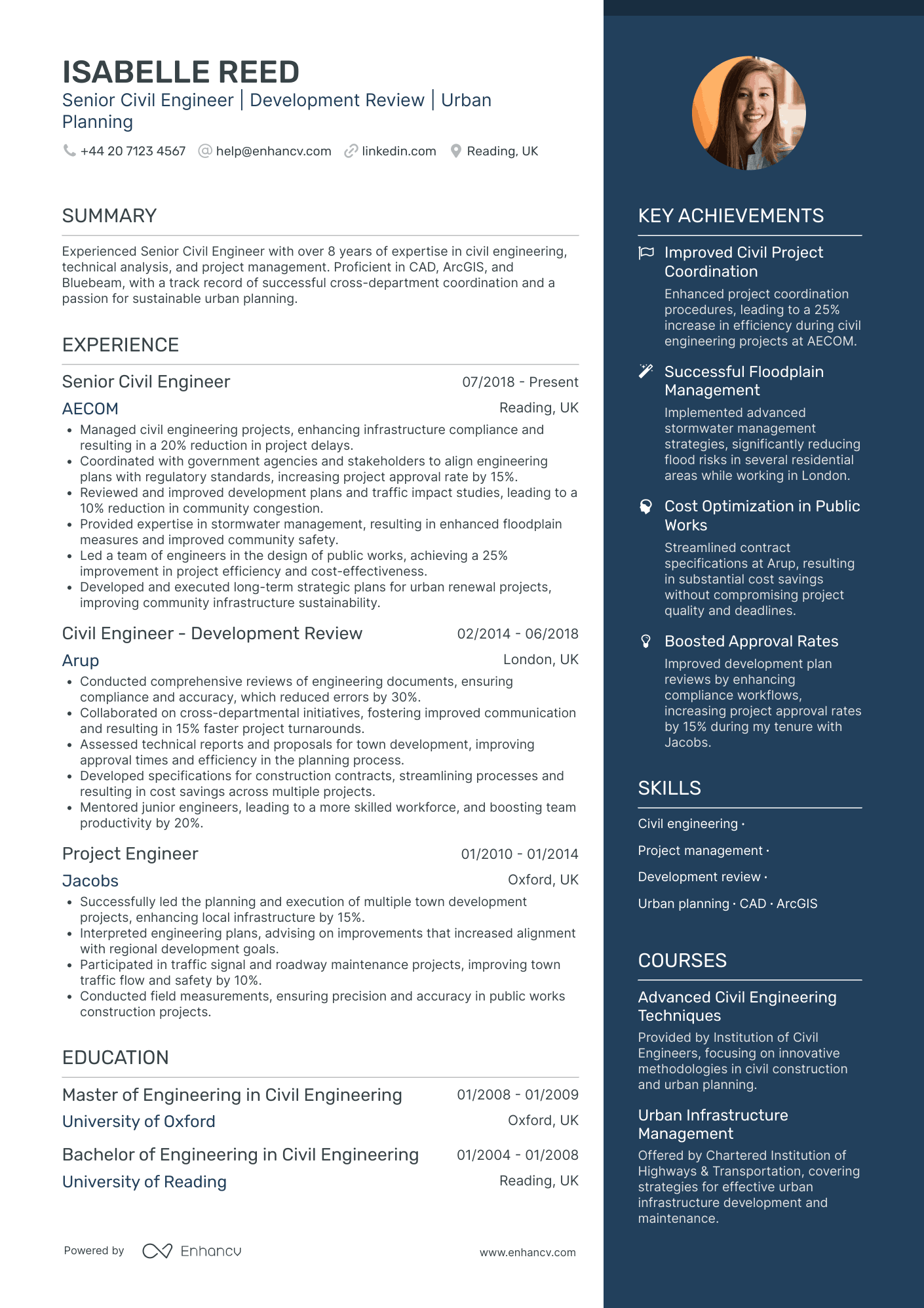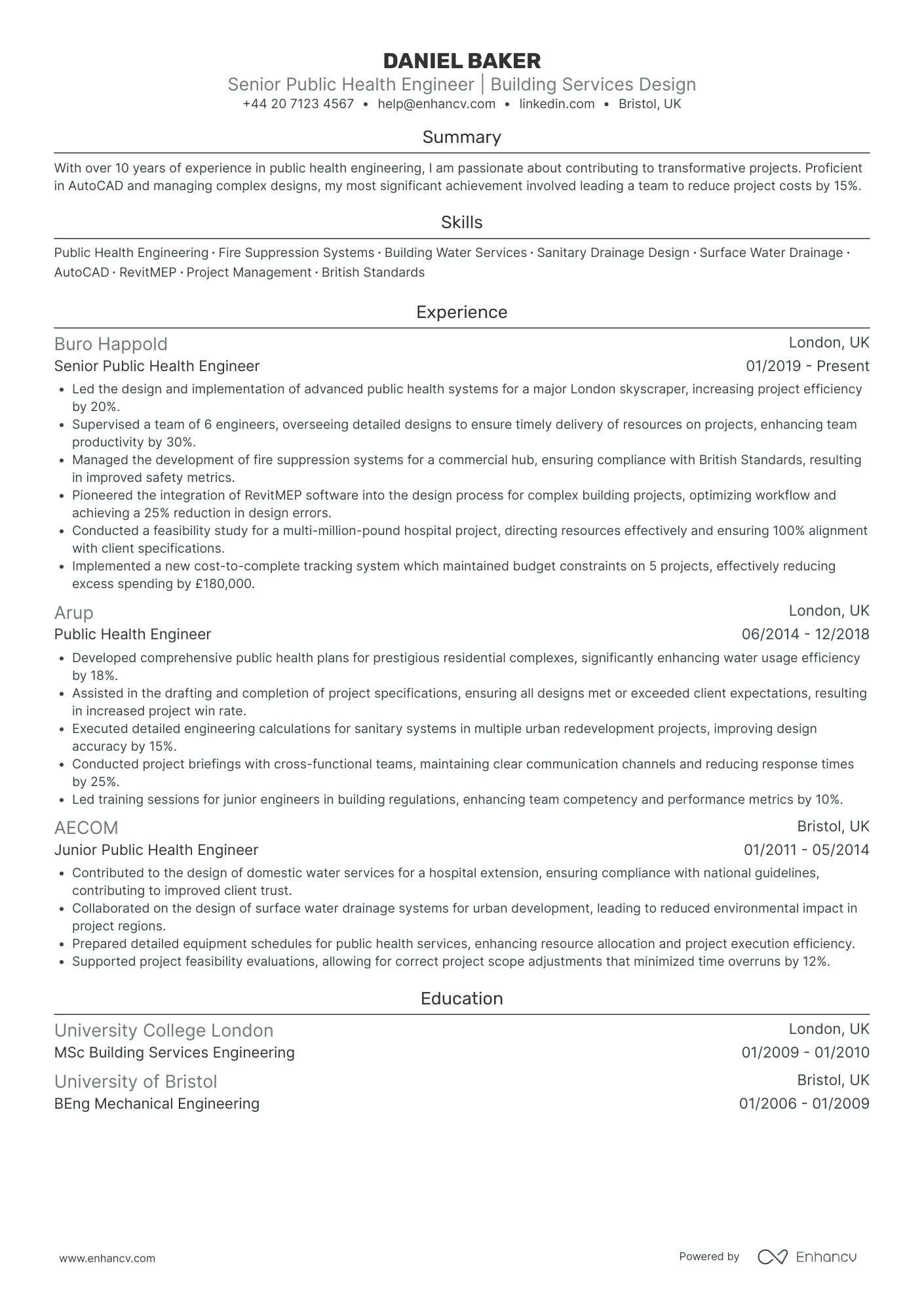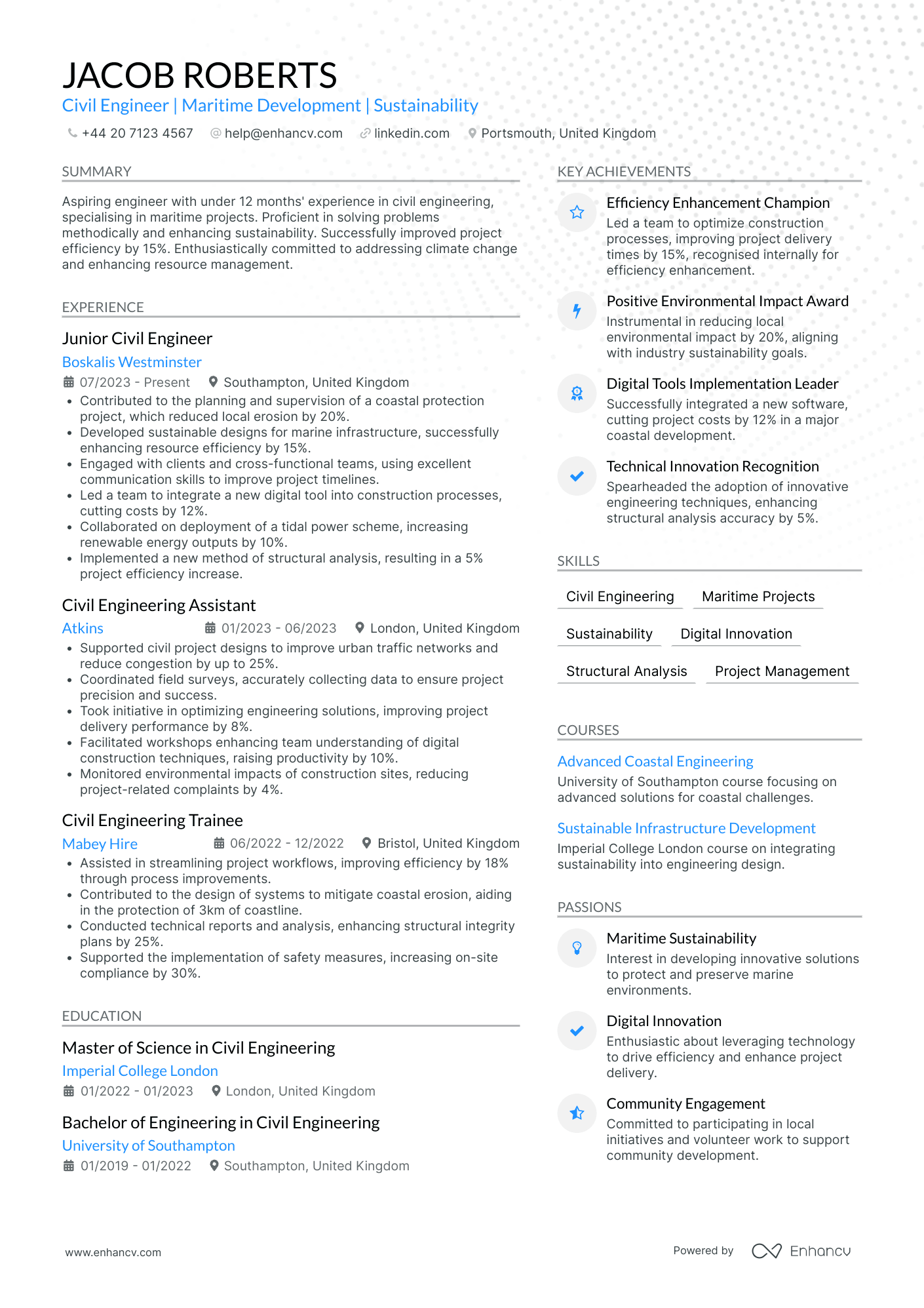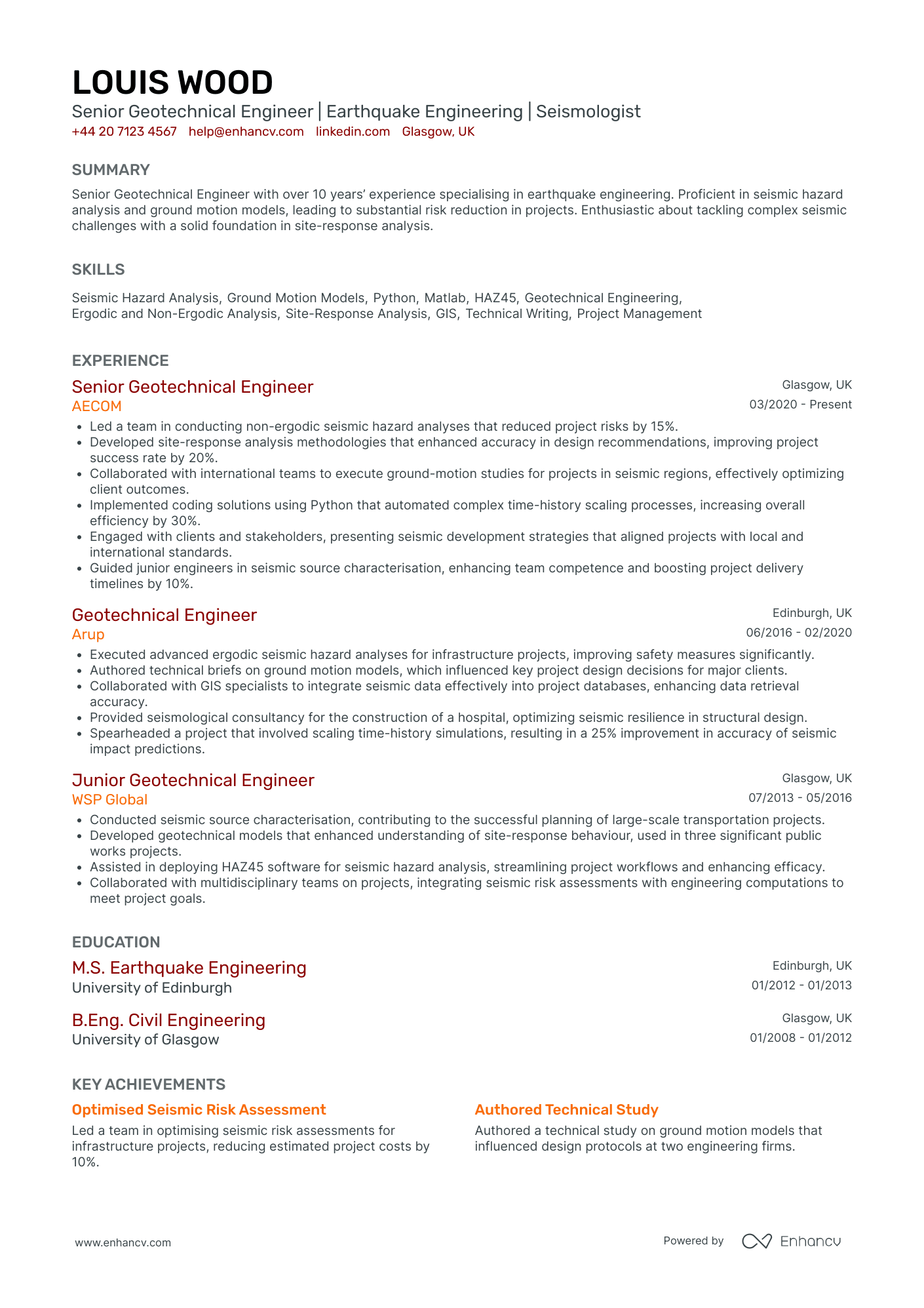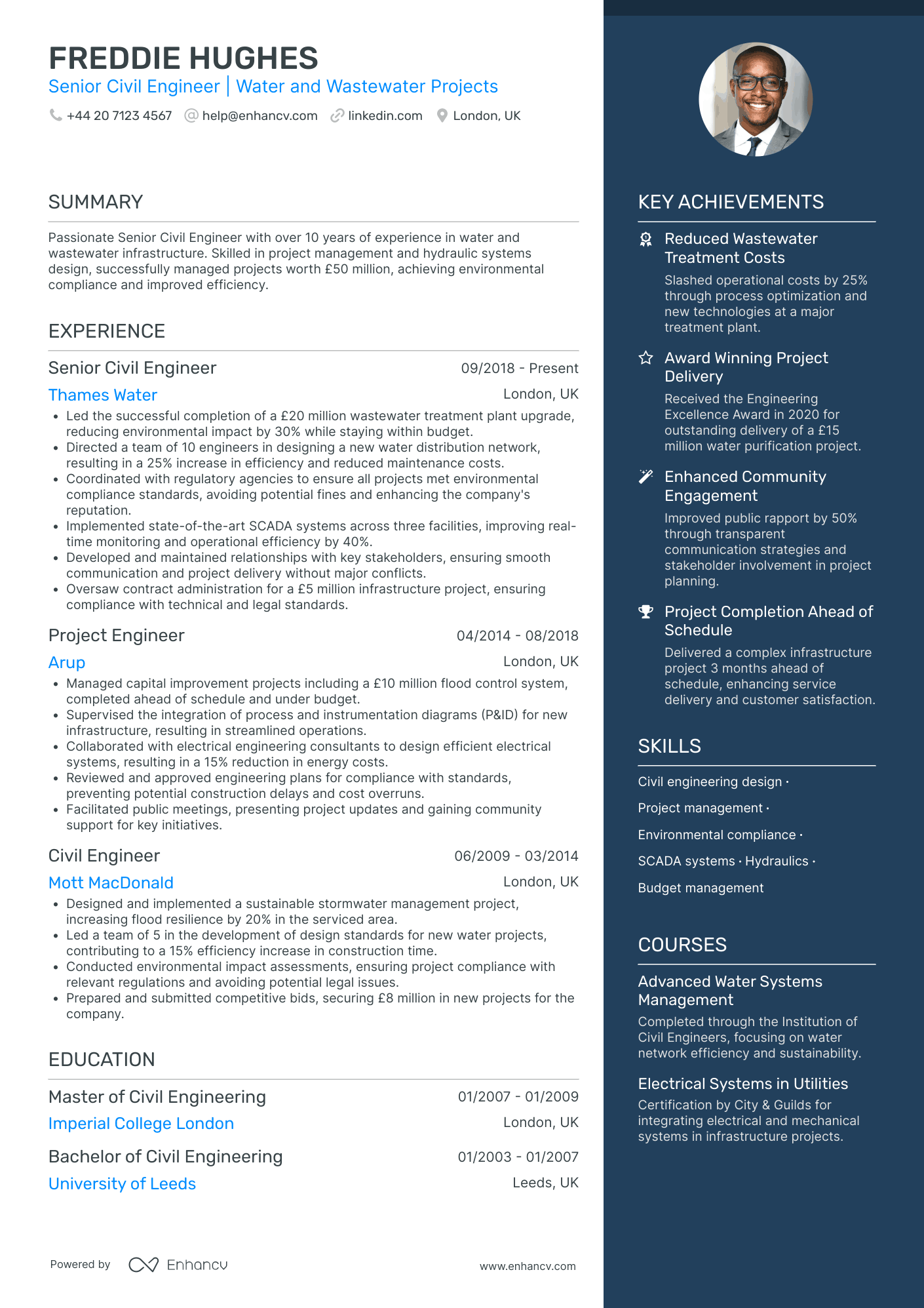One CV challenge commonly faced by civil engineers is effectively demonstrating the breadth of their project management skills. Our guide offers tailored insights and examples on how to condense complex projects into concise bullet points that highlight your leadership and organisational capabilities.
- Answer job requirements with your civil engineer CV and experience;
- Curate your academic background and certificates, following industry-leading CV examples;
- Select from +10 niche skills to match the ideal candidate profile
- Write a more succinct experience section that consists of all the right details.
Do you need more specific insights into writing your civil engineer CV? Our guides focus on unique insights for each individual role:
CV examples for civil engineer
By Experience
Junior Civil Engineer
- Clear Career Progression and Growth - Amelia Murphy's CV showcases a steady career trajectory from an intern to an assistant civil engineer, indicating evident growth within the civil engineering industry. Her roles at notable firms like Arup and WSP are proof of her expanding expertise and increasing responsibilities in project management and design.
- Strong Leadership and Team Management Skills - The CV highlights Amelia's ability to supervise teams and manage projects effectively. Her experience in leading a team of field surveyors at Arup and spearheading a bridge project demonstrates her leadership qualities and ability to exceed project expectations, leading to enhancements in project timelines and client satisfaction.
- Technical Depth in Industry-Specific Tools - The CV emphasizes Amelia's proficiency in essential civil engineering tools and methodologies such as AutoCAD and advanced civil design techniques. This technical depth is complemented by her achievements in implementing new design software, which not only streamlined workflows but also enhanced overall project delivery speed and accuracy, contributing to significant productivity gains.
Graduate Civil Engineer
- Clear and Concise Structure - The CV is well-organized, with clearly defined sections that make navigating through Oscar Evans' career accomplishments straightforward. Each segment, from experience to education, is concise yet comprehensive, providing a full picture without overwhelming the reader with unnecessary details.
- Progressive Career Trajectory - Oscar Evans has shown significant career growth, moving from a Civil Engineer role to a Senior Project Engineer within five years. This trajectory highlights his ability to take on increasing responsibilities and showcases his advancement in the field of water infrastructure, reflecting a logical and impressive career path.
- Industry-Specific Expertise and Tools - The CV is rich with technical depth, highlighting Oscar's proficiency in industry-specific tools such as AutoCAD, Revit, and WaterGEMS. These mentions demonstrate his capability to utilize advanced technologies to solve complex engineering challenges effectively, critical for the role of a civil engineer in water infrastructure projects.
Principal Civil Engineer
- Clear and concise structure - The CV is well-organized, with distinct sections for each key area, such as experience, education, and skills. Each section is presented clearly and concisely, allowing for easy navigation and quick identification of relevant information. The bullet points within each role effectively highlight accomplishments without becoming overwhelming, maintaining focus on the most critical achievements.
- Demonstrates a progressive career trajectory - Eva Fisher's career shows a clear path of progression, beginning as a Graduate Civil Engineer and advancing to a Principal Site/Civil Engineer. This progression reflects increasing responsibility and expertise, demonstrating a commitment to career development. The roles Eva has held highlight her growth in the industry, with substantive achievements marking each step.
- Incorporates significant industry-specific methodology - The CV emphasizes proficiency in technical tools like AutoCAD and Civil 3D, critical for site planning and design in civil engineering. Eva's knowledge in areas such as stormwater management and soil erosion control showcases her technical depth and ability to apply specialized methodologies to reduce environmental impact and project costs, which is crucial for delivering sustainable engineering solutions.
Civil Engineer Project Manager
- Robust Career Growth - Harry Williams' career trajectory demonstrates impressive growth, moving from a Junior Civil Engineer to a Senior Civil Engineer within eight years. This progression indicates a strong capability to take on increasing responsibilities and leadership roles, all within renowned firms in the industry.
- Strategic Implementation of Advanced Tools - The CV highlights Harry's proficiency with industry-specific tools such as AutoCAD and MS Project, which have been leveraged to optimize project outcomes. His ability to increase efficiency by 20% through advanced project management software underscores his technical depth and strategic foresight.
- Sustainable Practices and Client-Centric Approaches - A notable aspect of the CV is the focus on sustainable practices and client satisfaction. The successful implementation of sustainability initiatives that reduced environmental impact by 20%, along with a 30% boost in client satisfaction, showcases how Harry effectively intertwines technical execution with customer-focused strategies.
Lead Civil Engineer
- Strategic Career Growth in Renewable Energy - Alfie Edwards has demonstrated a steady career progression from Civil Engineer to Lead Civil Engineer. His trajectory exemplifies effective leadership, evidenced by his roles in prominent renewable energy firms, such as Lightsource BP and EDF Renewables. This linear growth reflects an ongoing dedication to developing expertise and contributing significantly to the field of solar energy.
- Innovative Practice in Civil Engineering Tools - The CV stands out with its emphasis on advanced civil engineering tools and methodologies. Alfie is adept in AutoCAD and Civil 3D, particularly noted for his expertise in solar grading design and stormwater management. These capabilities not only highlight technical proficiency but also illustrate his commitment to adopting cutting-edge tools to improve project outcomes.
- Impactful Achievements with Business Relevance - Alfie's CV eloquently showcases achievements that translate into business success. An example is his Efficiency Enhancement Initiative, which improved project delivery time by 20%. Such accomplishments are not merely quantitative but have qualitative implications, including substantial time savings, cost reductions, and improved stakeholder satisfaction, reinforcing his capacity to enhance business operations.[
Civil Engineer Consultant
- Content presentation that reflects structured clarity - The CV is organized into clear sections such as experience, education, and skills, allowing easy navigation and understanding of the candidate's qualifications. Each bullet point concisely communicates achievements, contributing to a structured and professional presentation.
- Demonstrated career growth through promotions - The career trajectory of Louis Wood is marked by steady advancement, culminating in his current role as a Senior Structural Engineer. This progression from Assistant Engineer to Project Engineer and finally to his current consultant position underscores his consistent growth and increasing responsibilities within the civil engineering domain.
- Incorporation of industry-specific technical depth - The CV highlights Louis's proficiency with tools like AutoCAD and Revit, and showcases his expertise in regulatory compliance with international building standards. His technical knowledge is further supported by advanced courses in structural analysis and compliance, adding significant weight to his specialization in the field.
Civil Engineer Team Leader
- Structured and Concise Presentation - The CV is organized into clear sections that facilitate easy navigation and reading. Each section is well-defined, starting from personal details, followed by a succinct summary, experience, education, and other relevant elements. This efficient layout aids in quickly identifying the candidate's key qualifications and achievements.
- Progressive Career Trajectory - Arthur Davies' career progression is marked by gradual increases in responsibility, from a Project Coordinator to a Civil Engineer at notable companies. This trajectory demonstrates a strong upward movement in the field, reflecting continuous growth and the adaptation of new roles and challenges in complex engineering environments.
- Industry-Specific Technical Expertise - The CV highlights Arthur’s proficiency with industry tools such as AutoCAD Civil 3D, which is crucial for site development and infrastructure projects. This technical depth underlines his ability to utilize specialized software for delivering high-quality design and execution in civil engineering projects.
Entry-Level Civil Engineer
- Concise and Structured Presentation - The CV is structured logically, presenting each section clearly and concisely. Key achievements and responsibilities are highlighted in bullet points, making it easy for recruiters to quickly grasp the candidate's qualifications and experience. The strategic use of quantifiable data enhances the effectiveness of the information presented.
- Impressive Career Growth in Engineering - Max's career trajectory demonstrates significant growth and advancement within well-known engineering firms such as Alstom, Siemens, and AECOM. He has progressed from an Assistant Civil Engineer to a specialized role as a Transmission Line Design Specialist, indicating consistent development of skills and expertise in his field.
- Technical Expertise in Niche Areas - The CV highlights deep technical knowledge in transmission line design and structural analysis, alongside expertise in specialized areas like fibre optic technology integration. Max’s education and courses further support his role-specific skills, showing a commitment to ongoing learning and staying current with industry advancements.
Experienced Civil Engineer
- Structured presentation with strategic clarity - The CV is organized systematically, allowing easy navigation through sections like experience, education, skills, and achievements. Each section is concise yet informative, presenting Ruby Gibson's qualifications and career history clearly and effectively for a civil engineering role.
- Progressive position advancements reflecting career growth - The career path shows significant advancement from a Junior Civil Engineer at Mott MacDonald to a Senior Civil Engineer at Arup. These promotions within the civil engineering sector reveal not only professional growth but also increased responsibilities in leadership and project management.
- Integration of technical tools specific to civil engineering - Ruby Gibson's proficiency in industry-specific software such as AutoCAD, Civil 3D, and TEDDS showcases technical depth. This expertise in leveraging engineering and design tools is essential for enhancing project delivery speed and accuracy, crucial for successful civil engineering projects.
By Role
Civil Engineer in Transportation
- Clear Structure and Conciseness - Elsie Murray's CV is well-organized, with each section clearly labeled, enhancing readability and engagement. The use of bullet points in the experience section allows for concise presentation of achievements, actions, and results, providing a quick yet comprehensive view of qualifications and accomplishments.
- Steady Career Growth in Civil Engineering - Despite having under 12 months of experience, the CV reflects a rapid career trajectory within reputable engineering firms such as Arup, Atkins, and Balfour Beatty. With roles ranging from Assistant Engineer to Junior Civil Engineer, Elsie has demonstrated a capacity to take on increasing responsibilities and make significant contributions to major projects.
- Industry-Specific Expertise with Sustainability Focus - Elsie’s experience and education highlight a strong commitment to sustainability, a critical aspect in civil engineering. Courses such as "Sustainable Infrastructure Planning" and achievements like leading a sustainability initiative in tunnel projects underline her technical depth and dedication to eco-friendly practices, differentiating her in the field.
Civil Engineer in Water Resources
- Clear and structured presentation - The CV is presented with a logical structure that flows seamlessly from one section to the next. It opens with a concise header, followed by a well-summarized personal statement that sets the stage for what follows. The experiences are listed chronologically, allowing for an easy-to-follow career progression, and each entry includes specific achievements, which highlight the candidate’s impact in each role.
- Consistent career growth and specialization - The candidate's career trajectory demonstrates a clear and consistent growth path within civil engineering, particularly focusing on water infrastructure. Starting as a Junior Project Engineer, Leo has swiftly ascended to roles with greater responsibility, such as Civil Engineer and Consultant, reflecting a pattern of escalating expertise and leadership within the field.
- Significant industry-specific expertise - The CV showcases Leo's technical depth through specialized roles focusing on water infrastructure and hydraulic engineering. Notable achievements in hydraulic analysis and sustainable urban drainage design emphasize a robust understanding of complex water management systems. This specialization is further reinforced by completing advanced courses and holding relevant degrees in the field.
Civil Engineer in Construction
- Effective Content Presentation - This CV excels in clarity and structure, presenting information concisely across all sections. Every detail is organized logically, making it straightforward for potential employers to understand Ruby Gibson's qualifications and achievements without being overwhelmed by superfluous information.
- Strong Career Trajectory - Ruby Gibson demonstrates consistent career growth, moving from Assistant Engineer to Civil Engineer within prestigious firms like AECOM and Arup Group. This progression reflects her expanding expertise and readiness to tackle larger responsibilities in construction management and infrastructure projects over seven years.
- Strategic Achievements and Impact - The CV highlights achievements that not only reflect Ruby's individual competence but underscore her business acumen. For instance, her ability to reduce project costs by 20% on a major bridge project illustrates an understanding of financial management alongside engineering prowess, directly benefiting project budgets and timelines.
Civil Engineer in Structural Engineering
- Clear and Concise Content Presentation - The CV is methodically laid out with sections clearly demarcating various aspects of Chloe's professional journey. It provides a rapid understanding of Chloe’s capabilities and contributions using concise bullet points and specific metrics, ensuring clarity and focus throughout.
- Impressive Career Trajectory and Growth - Chloe's career path shows substantial growth, progressing from an Associate Engineer role to a Senior Structural Engineer position. This trajectory highlights not only her technical prowess but also her growing responsibilities and leadership skills within the engineering discipline, particularly in the nuclear industry.
- Industry-Specific Expertise with Technical Depth - The CV distinguishes itself by detailing Chloe's proficiency in complex seismic analysis, rigorous structural modeling, and compliance with nuclear safety regulations. This technical depth, paired with advanced certifications like the Advanced Seismic Design Certification, underlines Chloe’s specialized knowledge in structural engineering within high-risk environments.
Civil Engineer in Environmental Engineering
- Structured and Concise Presentation - The CV is methodically organized, reflecting clarity and precision in content presentation. Each section is well-defined, maintaining conciseness while covering essential aspects of the candidate's professional journey, ensuring that critical information is easily accessible to potential employers.
- Progressive Career Path in Civil Engineering - Jack's career trajectory is marked by strategic growth and increasing levels of responsibility, reflecting a deliberate advancement from an Assistant Engineer to a Geotechnical Engineer. This progression demonstrates his commitment to mastering geotechnical engineering and taking on complex project roles within leading engineering firms.
- Significant Project Achievements and Impact - The CV highlights noteworthy achievements with quantifiable impacts on the business, such as boosting project efficiency by 30% and enhancing client retention by 12%. These metrics not only showcase Jack's technical expertise but also underline his ability to deliver substantial business value through his engineering projects.
Civil Engineer in Geotechnical Engineering
- Structured and comprehensive presentation - The CV is well-organized, providing a clear outline of various sections such as experience, education, skills, and achievements. Each section is concise, containing bullet points that make it easy to digest complex information about the candidate’s professional journey, ensuring clarity and coherence for the reader.
- Robust career growth in the geotechnical field - Thomas Walker’s career progression is evident, moving from a Geotechnical Engineer to a Senior Geotechnical Engineer, reflecting significant professional development and capability within the field. This trajectory highlights his advancing responsibilities and expanding expertise, especially in a specialized domain such as geotechnical engineering.
- Demonstrated effective leadership and client management - The CV underscores Walker’s leadership skills, with examples of managing teams, improving productivity, and enhancing client satisfaction. His ability to foster strong client relationships signifies an adeptness in communication and leadership, which are crucial for project success and client liaison roles.
Civil Engineer in Urban Development
- Structured Clarity and Conciseness - The CV is well-organized, beginning with a concise and impactful summary that quickly communicates Isabelle Reed's extensive experience in civil engineering and urban planning. Each section is clearly delineated, allowing for easy navigation through her professional background, education, skills, and achievements, making it highly accessible and straightforward for readers.
- Career Trajectory Reflects Growth and Leadership - Isabelle's career progression from Project Engineer at Jacobs to her current role as a Senior Civil Engineer at AECOM is marked by increasing responsibilities and leadership opportunities. This trajectory highlights her growth within the industry, showcasing her ability to lead teams, manage complex projects, and drive strategic initiatives in urban planning.
- Industry-Specific Tools and Advanced Methodologies - The CV emphasizes Isabelle's proficiency in industry-specific tools such as CAD, ArcGIS, and Bluebeam, which are critical for her role in civil engineering and urban planning. Her involvement in innovative methodologies for infrastructure sustainability and stormwater management denotes a deep technical competence and commitment to environmental stewardship in her field.
Civil Engineer in Public Health
- Strong career progression and leadership - Daniel Baker’s CV showcases a clear trajectory from a Junior Public Health Engineer to a Senior Public Health Engineer, highlighting his growth in managing larger teams and more complex projects, evident from his leadership roles in significant organizations like Buro Happold and Arup.
- Integration of advanced design tools and methodologies - Daniel demonstrates expertise in using industry-specific software like AutoCAD and RevitMEP, which indicates his capability to integrate complex digital tools into the design process, optimizing workflows and reducing errors, vital for building service designs.
- Impactful achievements with business relevance - The CV emphasizes achievements like leading a cost optimization initiative that saved £180,000 and implementing systems that increased project efficiency by 20%, showcasing not just numerical successes but also the significant business impacts of his contributions.
Civil Engineer in Coastal Engineering
- Structured Content with Clear Focus - The CV is well-structured and logically organized, starting from a succinct summary leading into detailed sections on experience, education, and skills. The content presentation is concise, with bullet points providing clear, quantifiable evidence of performance, which enhances readability and understanding of the candidate's capabilities.
- Rapid Career Development in Specialized Areas - Jacob Roberts shows swift professional growth, moving from a trainee to a junior civil engineer in under two years, which demonstrates ambition and capability. His focus on maritime development and sustainability reflects a clear and consistent career trajectory, highlighting a commitment to niche areas that are crucial in civil engineering.
- Application of Innovative Engineering Techniques - The CV reveals Jacob's hands-on experience with industry-specific methodologies and tools, such as integrating new digital tools for construction and applying advanced coastal engineering solutions. His technical depth is exhibited through achievements like enhancing renewable energy outputs and improving structural analysis methods, making him a unique asset in maritime engineering projects.
Civil Engineer in Earthquake Engineering
- Clarity and Structure in Presentation - The CV is well-structured with each section clearly defined, ensuring that information is easy to navigate and digest. The use of bullet points helps in presenting complex engineering feats concisely, making it accessible to both technical and non-technical audiences.
- Diverse Career Trajectory - Louis Wood has shown significant career progression, moving from a Junior Geotechnical Engineer to a Senior Geotechnical Engineer, with responsibilities becoming more strategic over time. The progression within prominent companies like WSP Global, Arup, and AECOM demonstrates a solid career path and increasing trust in his expertise in seismic engineering.
- Integration of Technical Depth and Tools - The CV highlights industry-specific methodologies such as non-ergodic seismic hazard analysis, HAZ45, and advanced ground motion models, reflecting a deep understanding and command over complex engineering tools and processes that are crucial in earthquake engineering. His ability to implement Python for automation further accentuates his technical prowess in enhancing operational efficiency.
Senior Civil Engineer
- Emphasizes Diverse Professional Experience - The CV is structured to highlight the candidate's journey through a variety of roles within the marketing sector. This progression is illustrated chronologically, showing clear transitions from entry-level positions to more senior roles, such as Marketing Manager and Strategy Lead. Such a layout not only demonstrates their growth and adaptability but also how they've leveraged each opportunity to expand their expertise across different industry landscapes.
- Leverages Industry-Specific Tools and Techniques - The CV stands out due to its inclusion of industry-specific methodologies and tools the candidate has mastered, like Salesforce for CRM analytics, and HubSpot for inbound marketing. It further includes proficiency in cutting-edge SEO software and strategies, showcasing technical depth and a solid understanding of the digital marketing landscape—elements crucial for staying competitive in the industry.
- Showcases Leadership and Team Development Skills - This CV goes beyond listing professional achievements and hones in on the candidate's ability to lead and inspire cross-functional teams. It highlights experiences in managing teams of various sizes, spearheading training programs, and implementing performance improvement initiatives, underscoring their capacity as an influential leader who not only contributes to organizational success but also fosters growth among team members.
How complex should the format of your civil engineer CV be?
Perhaps, you decided to use a fancy font and plenty of colours to ensure your civil engineer CV stands out amongst the pile of other candidate profiles. Alas - this may confuse recruiters. By keeping your format simple and organising your information coherently, you'll ultimately make a better impression. What matters most is your experience, while your CV format should act as complementary thing by:
- Presenting the information in a reverse chronological order with the most recent of your jobs first. This is done so that your career history stays organised and is aligned to the role;
- Making it easy for recruiters to get in touch with you by including your contact details in the CV header. Regarding the design of your CV header, include plenty of white space and icons to draw attention to your information. If you're applying for roles in the UK, don't include a photo, as this is considered a bad practice;
- Organising your most important CV sections with consistent colours, plenty of white space, and appropriate margins (2.54 cm). Remember that your CV design should always aim at legibility and to spotlight your key information;
- Writing no more than two pages of your relevant experience. For candidates who are just starting out in the field, we recommend to have an one-page CV.
One more thing about your CV format - you may be worried if your double column CV is Applicant Tracker System (ATS) complaint. In our recent study, we discovered that both single and double-column CVs are ATS-friendly . Most ATSes out there can also read all serif and sans serif fonts. We suggest you go with modern, yet simple, fonts (e.g. Rubik, Lato, Raleway) instead of the classic Times New Roman. You'll want your application to stand out, and many candidates still go for the classics. Finally, you'll have to export your CV. If you're wondering if you should select Doc or PDF, we always advise going with PDF. Your CV in PDF will stay intact and opens easily on every OS, including Mac OS.

PRO TIP
Use bold or italics sparingly to draw attention to key points, such as job titles, company names, or significant achievements. Overusing these formatting options can dilute their impact.

The top sections on a civil engineer CV
- Professional Summary: It summarises expertise and experience.
- Education and Qualifications: It shows relevant academic credentials.
- Professional Experience: It details job history and civil engineering roles.
- Engineering Projects: It highlights completed projects and achievements.
- Technical Skills: It showcases proficiency in civil engineering software.

What recruiters value on your CV:
- Highlight your technical skills, such as proficiency in CAD software, BIM tools, and project management software, as these are pivotal in planning, designing, and managing civil engineering projects.
- Detail your experience with infrastructure projects, including roads, bridges, dams, or water treatment systems, to demonstrate hands-on competence and industry relevance.
- Emphasise any professional certifications like Chartered Engineer (CEng) status or affiliations with recognised bodies such as the Institution of Civil Engineers (ICE), showcasing your commitment to professional standards.
- Feature your understanding of industry-specific regulations and standards, for example, the Eurocodes or British Standards, which is essential for ensuring compliance in civil engineering work.
- Describe your involvement in the entire project lifecycle, from feasibility studies and environmental impact assessments to design, construction, and maintenance, to reflect your comprehensive skill set.
Recommended reads:
Making a good first impression with your civil engineer CV header
Your typical CV header consists of Your typical CV header consists of contact details and a headline. Make sure to list your professional phone number, email address, and a link to your professional portfolio (or, alternatively, your LinkedIn profile). When writing your CV headline , ensure it's:
- tailored to the job you're applying for;
- highlights your unique value as a professional;
- concise, yet matches relevant job ad keywords.
You can, for examples, list your current job title or a particular skill as part of your headline. Now, if you decide on including your photo in your CV header, ensure it's a professional one, rather than one from your graduation or night out. You may happen to have plenty more questions on how to make best the use of your CV headline. We'll help you with some real-world examples, below.

Examples of good CV headlines for civil engineer:
- Chartered Civil Engineer | Infrastructure Design | Project Management | BEng, MICE | 12 Years Experience
- Senior Civil Engineer | Highway Development Specialist | Contract Administration | CEng, 8+ Years Field Expertise
- Graduate Civil Engineer | Environmental Impact Assessment | Sustainable Construction | BSc Civil Engineering | 2 Years Practical Training
- Principal Structural Engineer | Bridge Design Authority | Seismic Retrofitting | MEng, CEng | 15+ Years Leading Projects
- Junior Civil Engineer | Water Resources Management | CAD proficient | BEng | Eager to Innovate & Grow
- Lead Geotechnical Engineer | Soil Mechanics Expert | Deep Foundations | PhD, Chartered Engineer | 10 Years Field Dominance
Your civil engineer CV introduction: selecting between a summary and an objective
civil engineer candidates often wonder how to start writing their resumes. More specifically, how exactly can they use their opening statements to build a connection with recruiters, showcase their relevant skills, and spotlight job alignment. A tricky situation, we know. When crafting you civil engineer CV select between:
- A summary - to show an overview of your career so far, including your most significant achievements.
- An objective - to show a conscise overview of your career dreams and aspirations.
Find out more examples and ultimately, decide which type of opening statement will fit your profile in the next section of our guide:

CV summaries for a civil engineer job:
- Seasoned Civil Engineer with over a decade of experience in designing, developing and overseeing large-scale infrastructure projects for renowned urban planning agencies in Europe. Skilfully manoeuvred through complex environmental assessments, securing necessary permits and approvals while consistently delivering projects below budget. Noteworthy achievement: Spearheaded the £20 million Thames Barrier refurbishment, increasing its operational efficiency by 30%.
- Dedicated professional boasting 15 years of progressive responsibility in civil engineering, with a sterling track record in seismic retrofitting and sustainable construction practices. Expert in advanced software such as AutoCAD Civil 3D and Revit. Proudly played a pivotal role in the seismic upgrade of the century-old Hammersmith Bridge, enhancing its lifespan by decades.
- Adept Financial Analyst transitioning to Civil Engineering, fuelled by a passion for sustainable urban development. Bringing forth strong analytical skills, a detail-oriented approach, and a Master's degree in Civil Engineering from Imperial College London. As an analyst, drove a 25% increase in ROI through strategic investment allocations for infrastructure funds, laying a strong foundation for entering the civil engineering field.
- Software Developer making a strategic shift into Civil Engineering after 5 years in tech, armed with a propensity for precision and a deep understanding of complex systems architecture. Graduated cum laude with a degree in Civil Engineering, facilitated the integration of AI into urban traffic systems, reducing congestion times by 40% in a pilot city project.
- Recently qualified Civil Engineer inspired by the transformative power of innovative infrastructural design, eager to apply theoretical knowledge and cutting-edge design software skills obtained through a Master’s degree at the University of Cambridge. Poised to contribute fresh perspectives to contemporary urban development challenges.
- Fresh graduate with a Bachelor's degree in Civil Engineering from the University of Bristol, aiming to leverage academic knowledge in structural analysis and fluid mechanics. Excited to apply energetic enthusiasm to practical projects and contribute to delivering high-quality, sustainable engineering solutions to modernise and enhance public infrastructure.
The best formula for your civil engineer CV experience section
The CV experience section is the space where many candidates go wrong by merely listing their work history and duties. Don't do that. Instead, use the job description to better understand what matters most for the role and integrate these keywords across your CV. Thus, you should focus on:
- showcasing your accomplishments to hint that you're results-oriented;
- highlighting your skill set by integrating job keywords, technologies, and transferrable skills in your experience bullets;
- listing your roles in reverse chronological order, starting with the latest and most senior, to hint at how you have grown your career;
- featuring metrics, in the form of percentage, numbers, etc. to make your success more tangible.
When writing each experience bullet, start with a strong, actionable verb, then follow it up with a skill, accomplishment, or metric. Use these professional examples to perfect your CV experience section:

Best practices for your CV's work experience section
- Analysed and designed structural components for various projects, ensuring compliance with local codes and engineering best practices, using software like AutoCAD and STAAD.Pro.
- Managed on-site construction activities, supervising operations and ensuring project completion within budget and timeline constraints, while maintaining strict adherence to safety regulations.
- Conducted site investigations to gather project requirements and environmental data, producing detailed reports and site plans that guided design and construction phases.
- Collaborated with architects, contractors, and project stakeholders to develop integrated solutions that balanced aesthetic appeal with structural functionality.
- Utilised advanced hydrological models to design, implement, and optimise sustainable drainage systems (SuDS) for various urban developments.
- Prepared and reviewed technical documents, including tender submissions, contract documents, and project specifications, ensuring accuracy and compliance with industry standards.
- Developed cost estimates and project budgets, performing risk analysis to minimise potential financial overruns and ensure financially viable project delivery.
- Implemented innovative construction materials and techniques, contributing to the advancement of sustainable and resilient infrastructure development.
- Led multidisciplinary teams through complex civil engineering projects, fostering effective communication and problem-solving to achieve successful project outcomes.
- Spearheaded the design and implementation of a new stormwater management system, reducing area flooding by 30% and improving local water quality.
- Coordinated with a team of 10 engineers to streamline project delivery times, achieving a reduction in project deadlines by 20% on average.
- Oversaw the development of transport infrastructure projects, leading to the improvement of traffic flow and reducing congestion in urban areas by 15%.
- Managed the £5 million budget of the Bridgewater Causeway Expansion project, ensuring project delivery within budget and a 10% cost saving.
- Implemented sustainable building practices in construction projects, resulting in a 25% reduction in energy usage for completed buildings.
- Led a cross-functional team to enhance the seismic resistance of existing infrastructure, increasing resilience by 40%.
- Developed and applied an innovative soil stabilisation technique which saved approximately 15% in construction costs for rural road projects.
- Played a pivotal role in the acquisition of two major contracts worth over £20 million through detailed proposal development and stakeholder engagement.
- Improved team productivity by 25% through the introduction of advanced CAD tools and continuous professional development workshops.
- Led the structural analysis for a high-rise development, optimising the design for material efficiency and achieving a 20% cost reduction in structural components.
- Collaborated with environmental agencies to incorporate eco-friendly design elements that contributed to obtaining a LEED Gold certification for a new commercial complex.
- Pioneered the use of BIM technology for the company, resulting in a 15% decrease in errors during the construction phase.
- Designed a highway interchange reconstruction project that improved travel times for commuters by an average of 10 minutes during peak hours.
- Instrumental in securing a competitive £12 million funding grant from government bodies by presenting compelling project feasibility reports.
- Instituted rigorous safety protocols that cut worksite accidents by over 50%, fostering a safer construction environment.
- Coordinated with municipal authorities on the development of flood defence schemes valued at £8 million that protected over 500 homes from seasonal flooding.
- Directed the geological survey team, culminating in the discovery of more cost-effective building routes that saved 15% in excavation and material costs.
- Championed the company's transition to utilising drone technology for surveying, doubling data collection rates and significantly reducing project times.
- Orchestrated the upgrade of a 50 km stretch of motorway, improving the infrastructure's lifespan by 25 years and enhancing capacity for future traffic demands.
- Formulated a strategic plan to manage £30 million in assets, which boosted the return on investment by streamlining maintenance schedules.
- Revitalized urban spaces by leading the public realm enhancement project, increasing commercial interest and property values by approximately 20%.
- Facilitated the construction of a major dam project, enhancing water supply to over one million residents and enabling a 30% increase in agricultural output in the region.
- Developed a comprehensive risk assessment plan that reduced potential project hazards by 40%, safeguarding both public health and the surrounding ecosystem.
- Implemented cutting-edge GPS and GIS systems for land surveying, which improved accuracy and efficiency by 60% over traditional methods.
Lacking professional expertise: how to write your CV to highlight your best talents
Don't count on your lucky stars when you're applying for a role, where you happen to have less (or almost none) professional experience. Recruiters sometimes do hire inexperienced candidates if they're able to present their unique value from the get-go. So, instead of opting for the traditional, CV experience section:
- List any applicable expertise you happen to have - no matter if it's a part-time job, internship, or volunteer work. This would hint to recruiters that your profile is relevant;
- Focus your CV on your transferrable skills or talents you've obtained thanks to your whole life and work experience. In effect, you'll be spotlighting your value as a candidate;
- Separate more space for your applicable academic background and certificates to show you have the technical know-how;
- Ensure that within your objective, you've defined why you'll like the job and how you'll be the perfect match for it. Always ensure you've tailored your CV to individual applications.
Looking for more good examples for your first job? We'll show you how other candidates, with less professional experience, have created their job-winning CVs.
Recommended reads:

PRO TIP
Include examples of how you adapted to new tools, environments, or work cultures, showing your flexibility.
Key civil engineer CV skills: what are hard skills and soft skills
Let's kick off with the basics. You know that you have to include key job requirements or skills across your CV. For starters, take individual skills from the job description and copy-paste them into your CV, when relevant. Doing so, you'll ensure you have the correct skill spelling and also pass the Applicant Tracker System (ATS) assessment. There are two types of skills you'll need to include on your CV:
- Hard skills - technical abilities that are best defined by your certificates, education, and experience. You could also use the dedicated skills section to list between ten and twelve technologies you're apt at using that match the job requirements.
- Soft skills - your personal traits and interpersonal communication skills that are a bit harder to quantify. Use various CV sections, e.g. summary, strengths, experience, to shine a spotlight on your workspace achievements, thanks to using particular soft skills.
Remember that your job-winning CV should balance both your hard and soft skills to prove your technical background, while spotlighting your personality.
Top skills for your civil engineer CV:
Structural analysis
Civil 3D
Hydraulics & Hydrology
Reinforced concrete design
Geotechnical engineering
Project management
Environmental engineering
Road and highway design
AutoCAD software proficiency
BIM (Building Information Modelling)
Problem-solving
Communication
Leadership
Teamwork
Attention to detail
Time management
Adaptability
Decision-making
Innovation
Conflict resolution

PRO TIP
If there's a noticeable gap in your skillset for the role you're applying for, mention any steps you're taking to acquire these skills, such as online courses or self-study.
Education and more professional qualifications to include in your civil engineer CV
If you want to showcase to recruiters that you're further qualified for the role, ensure you've included your relevant university diplomas. Within your education section:
- Describe your degree with your university name(-s) and start-graduation dates;
- List any awards you've received, if you deem they would be impressive or are relevant to the industry;
- Include your projects and publications, if you need to further showcase how you've used your technical know-how;
- Avoid listing your A-level marks, as your potential employers care to learn more about your university background.
Apart from your higher education, ensure that you've curated your relevant certificates or courses by listing the:
- name of the certificate or course;
- name of the institution within which you received your training;
- the date(-s) when you obtained your accreditation.
In the next section, discover some of the most relevant certificates for your civil engineer CV:

PRO TIP
If you have received professional endorsements or recommendations for certain skills, especially on platforms like LinkedIn, mention these to add credibility.
Recommended reads:
Key takeaways
Here are five things you need to remember about writing your civil engineer CV for success:
- Sort your experience based on the reverse chronological order, starting with your most recent career items, to showcase how you've grown your career;
- Include within your CV header your relevant contact details, a headline that could spotlight your unique value, and a photo - if you're applying for roles outside the UK or US;
- Decide to use the CV summary, if you happen to have more professional experience, and an objective, if you want to showcase your career goals;
- Within the experience section, write your bullets using action verbs, skills, and success, instead of just merely listing your on-the-job responsibilities;
- Prove your technical skills, using your education and certificates, and your soft skills, with your achievements and strengths sections.
